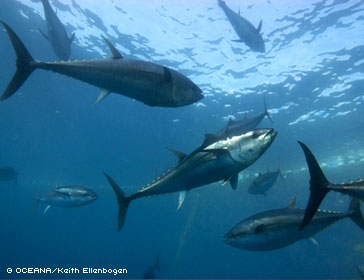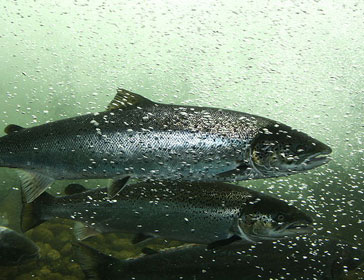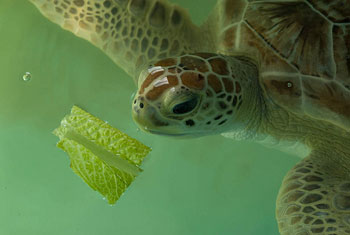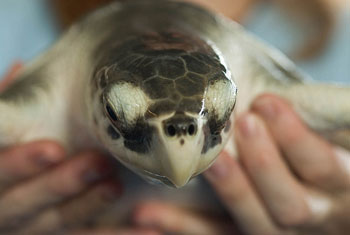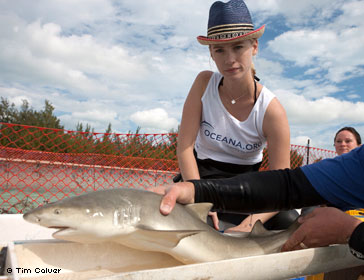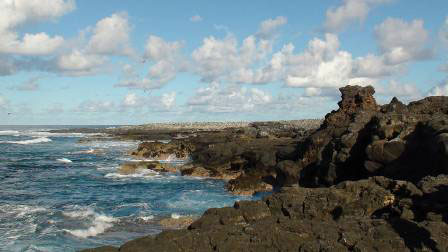|
OCEANA
About Oceana:
“Be an Ocean Hero” video Be An Ocean Hero from Oceana on Vimeo. Go to oceana.org/?heroes to make the pledge for the oceans and be an ocean hero. Join Oceana to protect the oceans today>> What Oceana Does Oceans cover 71 percent of the globe and not only do they control our climate, they are an essential source of protein for more than a billion people around the world. “What We Do” Oceana Video 2009 from Oceana on Vimeo. Oceana works in the following ways to protect our water planet: Promoting Responsible Fishing Three-quarters of the world’s monitored fisheries are fully exploited, overexploited or depleted, and since the 1950s, 90 percent of the big fish -- such as sharks, tuna and swordfish -- are gone. Global fishing subsidies support the excess fishing power of the world’s fishing fleet. Destructive fishing practices like bottom trawling waste more than 16 billion pounds of fish each year, while obliterating sensitive ocean habitats. Oceana works to ensure that fish are taken out of the ocean only at sustainable rates, and that the ocean ecosystems that produce them are maintained.
Stopping Ocean Pollution Oil spills, for which there is no reliable cleaning mechanism, continue to occur around the globe. Mercury emitted by land-based industrial plants finds its way back into our seafood with potentially serious consequences for fish and human health. Meanwhile, tons of concentrated fish waste from offshore fish farming despoils seafloor habitat by snuffing out oxygen and life. Oceana works to stop the fouling of the oceans from all of these sources.
Endangered sea turtles are caught unintentionally by fisheries around the world.
Scared For Sharks Every year, tens of millions of sharks are caught and killed for their fins. As a result, scientists say shark populations are crashing. We shouldn't be scared of sharks, we should be scared for them. Sharks have swum the world’s oceans since before the dinosaurs. They inhabit almost every ocean on Earth and are vital to the health of our planet. Please help us protect sharks — before it's too late. Learn more about Oceana's campaign to save sharks.
Actress January Jones at the Bimini Biological Field Station in the Bahamas.
In 2009 actress January Jones ("Mad Men") joined Oceana as the spokesperson for the shark campaign. Learn more about her involvement with Oceana at http://oceana.org/north-america/scared-for-sharks.
January Jones Swims with Whale Sharks “Mad Men” star January Jones traveled with Oceana to Belize’s Gladden Spit Marine Reserve to swim with the largest fish in the ocean: the whale shark.
Carbon dioxide is changing the very chemistry of the oceans, causing them to become more acidic and jeopardizing the future of coral reefs and organisms that produce shells. Oceana works to reduce the causes of climate change and ocean acidification and advocate for alternative energy sources such as offshore wind power. The oceans play an important role in regulating the Earth's temperature. As the levels of carbon dioxide and heat rise in the atmosphere, so do their levels in the oceans
Wind Energy: Support Offshore Wind Development
Oceana works to protect some of the most vital and threatened marine places on the planet. From Belize’s barrier reef to Chile’s Juan Fernandez Islands to the Alaskan Arctic, Oceana works to gain protections for Earth’s ocean gems.
Conducting On-the-Water Expeditions From Chilean Patagonia to the Baltic Sea to Monterey Bay, California, Oceana is working to protect the oceans through on-the-water expeditions. The resulting scientific data, photo and video documentation of rare and vulnerable species, as well as monitoring of illegal fishing, provides further evidence for the protection of vulnerable marine species and habitats. In late August 2010, Oceana Pacific teamed up with colleagues from Oceana Chile to explore and document Important Ecological Areas in Monterey Bay, California with a Remotely Operated Vehicle (ROV).
Learn more about Oceana’s work >> Oceana’s Victories Oceana has achieved dozens of policy victories for the oceans over the years. Here are just a few of Oceana’s recent successes. March 2011: Coal-Fired Power Plant Defeated in Chile For the second time in less than a year, Oceana helped defeat a coal-fired power plant on the coast of Northern Chile. The plant was slated to be a few miles from two marine reserves, and near the Humboldt Penguin National Reserve, which is home to the world’s largest population of Humboldt penguins. These plants would have posed a multitude of threats to the area’s marine habitats and wildlife. The plants would have used seawater as a coolant, discharging it back into the ocean at higher temperatures, killing some sea life. Plus, mercury emissions from the plants would have contaminated fish and mollusks like the Chilean abalone, damaging a crucial local industry. Plus, the carbon emissions from the plant would have contributed to the global climate crisis.
An international delegation passed new conservation measures that will protect more than 16.1 million square miles of seafloor habitat, including sensitive seamounts and deep-sea corals, in the North Pacific Ocean from bottom trawling and other bottom contact gear, which are extremely destructive. Oceana and others have been working to advance these measures since 2006. What are Marine Protected Areas: from NOAA Conservation and Management Objectives usoceangov
The Belizean government announced that all forms of trawling were banned in the country's waters. Bottom trawlers are some of the most destructive kinds of fishing gear, using nets weighing as much as several tons each to drag across large areas of seafloor. Oceana in Belize collaborated with Belizean Prime Minister Dean Barrow’s administration to negotiate the buy-out of the two shrimp trawlers. With this ban, Belize has become one of the first countries in the world to institute a complete and permanent ban on trawling in all its waters.
The U.S. House of Representatives approved the Senate version of the Shark Conservation Act, clearing the final hurdle to ending shark finning in U.S. waters. Shark finning is the brutal practice of slicing off a shark's fins, often for use in shark fin soup, an Asian delicacy. The shark -- sometimes still alive -- is thrown back into the water to bleed to death. The Shark Conservation Act improves the existing law originally intended to prevent shark finning. It also allows the U.S. to take action against countries whose shark finning restrictions are not as strenuous, labelling the U.S. as a continued leader in shark conservation. October 2010: Chile Creates Marine Reserve Around Sala y Gómez Island
Chile’s President Sebastián Piñera announced the creation of Sala y Gómez Marine Park, a no-take marine reserve of 150,000 square kilometers around Sala y Gómez island. The decision came after a preliminary expedition to Sala y Gómez by Oceana, National Geographic and the Waitt Foundation. The new park expands Chile’s total marine protected area more than 100 times, from 0.03% to 4.41%. See a full list of Oceana’s victories>>
|
||||||||||||||||||||
What Is Magic Porthole™? • Wonders of Coral Reefs • Episodes & Games • IYOR • News
Ecoknowledge Cards • Resources • Exhibit • Contests • Shop • Advisory Board • Dolphins • Credits
Oceana • Census of Marine Life • Sea Otters • Contact Us
